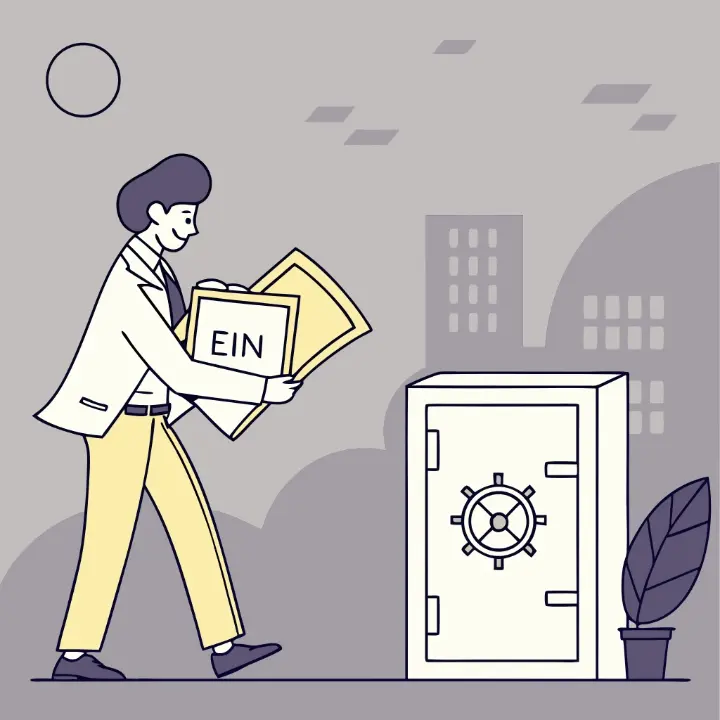If you're starting a Limited Liability Company (LLC) in California, one of the first steps you'll need to take is obtaining an Employer Identification Number (EIN). This nine-digit number, issued by the Internal Revenue Service (IRS), acts as your business’s tax ID number. Having an EIN is essential for several reasons, including opening business bank accounts, filing taxes, and hiring employees. Before you can obtain an EIN, you'll need to have established your LLC's legal name and structure with the state. You can perform a California Secretary of State Business Search to ensure your desired LLC name is available and compliant with state regulations.
In this guide, we will walk you through the process of obtaining an EIN for your California LLC, what it is, and why it’s required. We’ll also address common questions business owners have and provide a step-by-step approach for applying for your EIN.
What is an Employer Identification Number (EIN)?
An Employer Identification Number (EIN), also known as a Federal Tax Identification Number (TIN), is a unique nine-digit number assigned by the IRS. This number is used to identify your LLC for tax purposes, just as a Social Security Number (SSN) identifies an individual.
Why Do You Need an EIN for Your California LLC?
While you may not need an EIN for some smaller business structures like sole proprietorships, it’s essential for LLCs. Here are some of the reasons why you need an EIN for your California LLC:
- Tax Reporting: An EIN is required to file federal taxes, state taxes, and employment taxes.
- Hiring Employees: If you plan to hire employees, an EIN is required to manage payroll taxes, withholdings, and other employee-related filings.
- Business Bank Accounts: An EIN is necessary for opening a business bank account. Most banks will not open an LLC’s business account without an EIN.
- Protecting Personal Liability: Using an EIN helps separate your personal and business financial matters, which protects your personal assets.
When is an EIN Required for a California LLC?
For most LLCs, obtaining an EIN is not optional but a requirement. The IRS requires an EIN for LLCs in the following scenarios:
- Multi-Member LLCs: All multi-member LLCs are required to have an EIN. Since multi-member LLCs are taxed as partnerships, an EIN is necessary for filing taxes.
- Single-Member LLCs with Employees: If your single-member LLC hires employees, you must obtain an EIN.
- LLCs Electing Corporate Tax Treatment: Single-member LLCs that elect to be taxed as a corporation must also obtain an EIN.
Even if you are the sole member of your LLC and don’t plan on hiring employees, it’s still recommended to obtain an EIN. It simplifies the process of filing taxes and ensures your business remains in good standing with the IRS.
Determining Your Eligibility for an EIN
Multi-Member LLCs
For LLCs with more than one member, the EIN is required regardless of the LLC's income or whether employees are hired. The IRS considers multi-member LLCs as partnerships for tax purposes, so an EIN is necessary for filing partnership tax returns.
Single-Member LLCs (When Required)
For single-member LLCs, an EIN is required if the LLC has employees or if the LLC chooses to be taxed as a corporation. However, if the LLC has no employees and does not elect to be taxed as a corporation, the IRS generally allows a single-member LLC to operate using the owner’s Social Security Number (SSN).
Other Business Structures
Other business structures, such as corporations and partnerships, are also required to obtain an EIN. The IRS requires that all forms of business organizations, including those taxed as S corporations, C corporations, and partnerships, use an EIN for tax reporting.
Step-by-Step Guide to Applying for an EIN
Obtaining an EIN for your California LLC is a simple process, and it can be done either online, by mail, or by fax. Below is a detailed guide on how to apply for an EIN.

Step 1: Preparing the Necessary Information
Before you apply for your EIN, make sure you have the following information ready:
- Legal Name of the LLC: The legal name you used to register your LLC with the state of California.
- Responsible Party: The individual or entity that will be responsible for the LLC’s taxes. Typically, this is the owner or managing member.
- Principal Business Address: The address where your LLC operates or where it is legally registered.
- Type of Entity: Indicate whether your LLC is a single-member or multi-member LLC.
- Reason for Applying: Choose the reason for obtaining the EIN, such as starting a new business or hiring employees.
Step 2: Applying Online Through the IRS Website
The quickest and easiest way to apply for your EIN is by using the IRS online application tool. The online application process is free, and you’ll receive your EIN immediately once the application is complete.
- Visit the IRS website and locate the online EIN application page.
- Fill out the application form (Form SS-4) online with the required details.
- Submit the application. Once complete, you’ll receive your EIN immediately.
Pros: Fast and free. Immediate issuance of your EIN.
Cons: The online application is only available for businesses located in the United States or U.S. territories.
Step 3: Applying by Mail or Fax (Less Common)
If you prefer not to apply online, you can apply for your EIN by mailing or faxing a completed IRS Form SS-4 to the IRS. Be aware that the process may take several weeks.
- Download and complete IRS Form SS-4.
- Mail or fax the completed form to the appropriate IRS address or fax number. Check the IRS website for the latest contact information.
Pros: Available for businesses outside the U.S.
Cons: This process is slower and may take several weeks.
Step 4: What to Expect After Applying
Once you’ve completed your application, the next step is to wait for your EIN. If you applied online, you’ll receive your EIN immediately, and you can start using it right away for tax filings and business transactions.
If you applied by mail or fax, it may take 4-6 weeks to receive your EIN. Be sure to keep a copy of your EIN confirmation notice for your records.
Information You'll Need to Provide
Here is a breakdown of the information you’ll need to provide when applying for an EIN:
Legal Name of Your LLC
You’ll need the exact legal name of your LLC as it appears on your formation documents filed with the state of California.
Principal Business Address
This is the physical address of your LLC where business activities are conducted. A P.O. Box cannot be used for this address.
Responsible Party Information
The responsible party is the person or entity that is responsible for managing the LLC’s taxes. This is usually the owner or managing member of the LLC.
Linking to Initial Formation
Obtaining an EIN is just one part of the process of setting up your LLC in California. You will also need to complete the necessary steps to formally form your LLC with the state, including filing Articles of Organization and appointing a Registered Agent. Once your LLC is legally established, you can apply for your EIN and move forward with other business activities like opening a bank account and hiring employees.
Conclusion: Securing Your EIN and Moving Forward

Securing an EIN is an essential step in the process of starting a California LLC. Whether you're forming a multi-member LLC, a single-member LLC with employees, or a corporation, having an EIN is crucial for tax reporting, hiring employees, and separating personal and business finances.
Once your EIN is in hand, you can confidently move forward with other aspects of starting your business, such as opening a business bank account, applying for permits, and filing tax returns. Keep your EIN safe and use it whenever you file taxes or engage in any official business activities.
10 FAQs About Obtaining an EIN for Your California LLC
1. What is an EIN, and why do I need one for my LLC?
An EIN is a unique nine-digit number assigned by the IRS to identify your business for tax purposes. It’s required for filing taxes, opening business accounts, and hiring employees. Without an EIN, your LLC cannot legally hire employees, open a business bank account, or file taxes correctly, putting your business at risk for fines or penalties.
2. Is an EIN required for a single-member LLC?
Single-member LLCs don’t need an EIN unless they have employees or elect to be taxed as a corporation. Otherwise, a Social Security Number (SSN) may be sufficient. However, obtaining an EIN is still beneficial as it helps separate personal and business finances, providing legal protection and streamlining tax filings.
3. How long does it take to get an EIN?
If you apply online, you’ll receive your EIN immediately. Applications by mail or fax can take 4-6 weeks to process. If you need the EIN quickly for business transactions or tax filings, applying online is the fastest and most efficient option.
4. Can I apply for an EIN online?
Yes, the IRS allows businesses to apply for an EIN online. This is the fastest and easiest method. The online application is available during specific hours and is the preferred method due to the immediate issuance of the EIN.
5. Is there a fee for applying for an EIN?
No, obtaining an EIN is completely free through the IRS. Be cautious of third-party services that may try to charge you for applying, as these services are not necessary and may charge unnecessary fees for the application.
6. Can I use a P.O. Box as my business address for the EIN application?
No, the IRS requires a physical address for your business. P.O. Boxes are not acceptable for the EIN application. Using a physical address ensures that your business information is correctly recorded and that the IRS can contact you with any updates or issues.
7. What if I lose my EIN?
You can retrieve your EIN by contacting the IRS or checking any previous tax filings or business documents where the EIN is listed. Keeping a copy of your EIN confirmation notice or noting it in your business records can prevent delays in retrieving the number when needed.
8. Can I change my LLC’s name or address after obtaining an EIN?
Yes, if you change your LLC’s name or address, you should notify the IRS by filing a form to update your information. Failing to update the IRS may cause confusion with your filings and delay your tax processing, so it’s important to keep your records current.
9. Can a single-member LLC have multiple EINs?
Generally, no. A single-member LLC only needs one EIN unless it has employees or elects to be taxed as a corporation. Having multiple EINs for the same LLC can create complications during tax filing and could potentially lead to IRS errors.
10. Is an EIN the same as a business license?
No, an EIN is issued by the IRS for tax purposes, while a business license is issued by local authorities for business operation permission. An EIN helps you with tax obligations, while a business license is required for legally conducting business in your area.